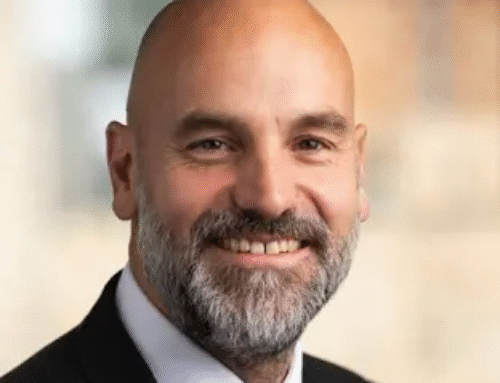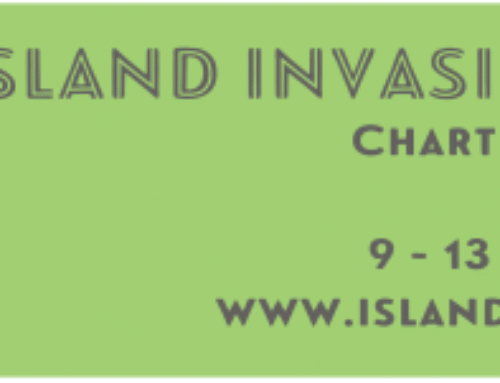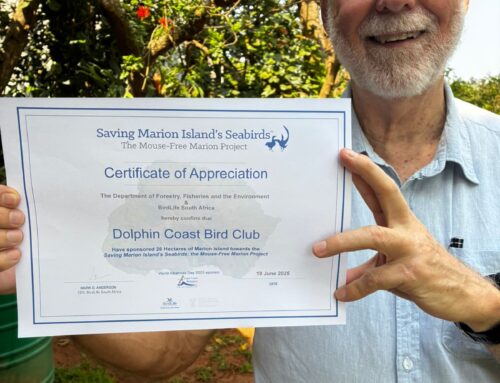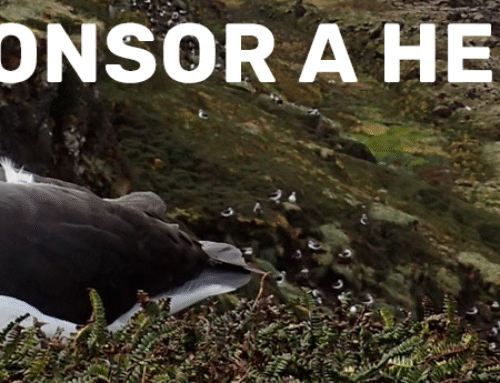Above Picture: Saving Marion Island’s Seabirds, a talk to the Wits Bird Club by Anton Wolfaardt
Mouse-Free Marion (MFM) has previously reported on the support provided to the project by four of the 41 bird clubs affiliated to BirdLife South Africa. In making their donations, two of these clubs issued a challenge to their sister clubs to support the project through its “Sponsor a Hectare” Campaign.
In order to learn more about the project, and to make its own sponsorship, the BirdLife South Africa-affiliated Witwatersrand Bird Club had previously contacted Dr Anton Wolfaardt, the MFM Project Manager, to ask if he would provide a presentation on the project as one of the club’s monthly talks. Although the Wits Bird Club does not normally charge for its talks, it decided to use the opportunity to raise funds for the MFM Project by charging a registration fee of 50 South African Rands and opening the talk up to other bird clubs and interested individuals in order to reach as many potential sponsors as possible.

Anton presented his talk via Zoom on 15 July, in which he provided an overview of the importance of Marion Island, which along with adjacent and mouse-free Prince Edward Island form South Africa’s only declared Special Nature Reserve, and the devastating impact that the introduced House Mice are having on this important sub-Antarctic locality.
The most visible of these impacts is the attacks and killing by the mice of the island’s globally important albatross and petrel chicks. However, the adverse impacts that mice are having on Marion Island are not limited to the seabirds. The mice, which are increasing in number, have also driven significant declines in the densities of invertebrates, such as the endemic flightless moth, and a number of indigenous plant species. The terrestrial invertebrate fauna plays a vitally important role in cycling the limited nutrients on the island, and so the reduction in their biomass undermines this crucial ecological process. The mice are literally eating Marion Island into a state of ecological crisis. The talk highlighted the urgent need to eradicate the mice to restore the island’s ecosystem and secure a positive conservation future of its important seabird populations. It also provided some insights into the planning underway to achieve that aim.
A total of 71 people registered for the talk, with 41 attending the live online presentation. Subsequent to the presentation, copies of the recording made of the talk were sent to those people who were unable to attend that evening. The total raised in fees and additional donations enabled the club to sponsor six hectares (at South African Rands 1000 a hectare) of the island’s 30 000 ha.
Positive reaction was received from all who listened to the talk and Anton was asked a number of pertinent questions by listeners eager to know more about the project.
Anton will present a similar talk to the BirdLife South Africa-affiliated Inkwazi Bird Club in August this year. He has also been invited to deliver an online presentation on the MFM Project to the Royal Geographical Society – Hong Kong. It is hoped that these presentations will help encourage further interest in and support of the project. Approaches from other BirdLife South Africa-affiliated clubs for talks, along with offers of sponsorships, will be warmly welcomed.
With grateful thanks to Diana Cowen, Andy Featherstone and members of the Witwatersrand Bird Club for the most welcome sponsorship.
Anton Wolfaardt, Mouse-Free Marion Project Manager, 27 July, 2021











